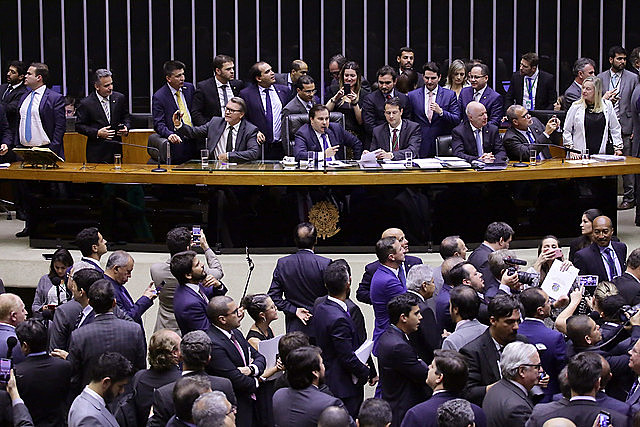Brazil’s lower house of Congress passed in the early hours of Wednesday the controversial pension reform bill proposed by the country’s right-wing president, Jair Bolsonaro, by a margin of 370 to 124 votes. It needed a threshold of 308 votes to pass this second round of voting.
The day before the vote, Bolsonaro submitted a bill to Congress to deliver R$3 billion (US$76 million) in federal funds so that some lawmakers can decide how to use them. The move, known as “parliamentary amendment” to the federal budget, is seen as a way to ensure that the necessary number of lawmakers would vote to pass the pension overhaul.
Offering federal funds to secure the passage of a bill presented by the government is an age-old form of self-serving politics in the legislative branch.
In exchange for supporting an unpopular bill, members of Congress receive funds through amendments to the federal budget to invest in their bedrock constituencies.
The leader of the Socialism and Freedom Party (PSOL) in the country’s lower house, Ivan Valente, criticized the government’s conduct and also how the media has been treating the topic.
In recent days, many mainstream outlets reported on the offer of federal funds as a way for the government to “honor its commitment” with lawmakers who promised to give the green light to the overhaul.
“It’s blatant and shameful. It’s using public money to corrupt and manipulate. There’s a name for that: it’s called ‘corruption.’ Not to mention that they offered high-ranking positions in state-run companies, agencies, etc. The worst part is that all of this happened and Brazil’s mainstream media was completely silent about it and cynically disregarded the issue in order to corner Brazilian workers, who are the ones who are going to pay the price of this reform,” Valente said.
Proposed changes
Later on Wednesday afternoon, the majority of the representatives repealed eight amendments to the bill, seven presented by left-leaning opposition parties and one proposed by government allies.
While the opposition tried to delay the vote and a fuss was created after the news broke that the former president of Brazil Luiz Inácio Lula da Silva could be transferred from Curitiba to a prison in the state of São Paulo, government allies were able to secure the deliberation on the amendments to the bill and finish the pension reform vote on the floor.
One of the changes was repealed by a margin of 339 to 153 votes. It was proposed by the Communist Party of Brazil (PCdoB) and supported by left-leaning parties, which intended to eliminate the part of the reform that allows payments below a minimum wage to pensioners who have other sources of income.
To vote against the proposed changes to the base text of the bill, government supporters argued that passing them would result in R$38 billion (roughly US$10 billion) less saved over a decade than if the change was not passed.
“It’s a point they constantly make, but that disregards the social reality of the country, which is deeply unequal in terms of income distribution and extreme poverty. That argument is absolutely cruel, especially because we know that kind of money is not even one percentage point of what banks make every year from interest rates,” PCdoB leader Daniel Almeida said.
Another controversial aspect involves a bonus that is paid every year to workers who receive no more than two minimum wages, R$1,996, or roughly US$500 a month. The base text of the bill, estimating the government would save R$76.4 billion in ten years, limits the bonus to workers who receive no more than R$1.364,43, or US$345 a month.
The representatives with the PSOL proposed a change to this point, but it was repealed by 345 to 139. The opposition, people’s movements, and trade unions argue that 10 million workers will no longer be entitled to the benefit.
“This is really bad. Unfortunately, the congressmen are voting based on the more than R$3 billion they received from federal funds. They had absolutely no social awareness, even though we talked to all parties to address all these issues,” said the legal secretary of the Unified Workers’ Central (CUT), Valeir Ertle. “Now we are going to work to try to overturn this process in the Senate.”




